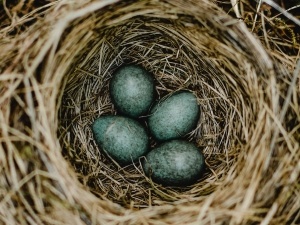
Recognizing when a human woman is about to give birth is pretty simple, the contractions will come, her water will break, and she will be in a whole lot of pain.
Figuring out whether your bird is going to lay an egg can be more difficult, this article looks into it.
Signs your bird is going to lay an egg:
Whether you’re getting ready to raise a baby bird after the mother bird has laid an egg, or getting ready to take the eggs to eat or sell, you need to know one thing, when the mother is going to lay the egg.
The term “gravid” is used for animals the same way that “pregnant” is used for humans. Here is how to know that your bird is gravid, or is going to lay an egg:
Enlarged abdomen: If you know your bird to have a certain shape, and this shape changes to become enlarged at the abdomen area, then your bird may be gravid and getting ready to lay an egg.
There will be a clear bulge of your bird’s abdomen as the bird grows the egg.
Firm abdomen: If you know what your bird’s abdomen feels like, when it isn’t gravid, and you feel it while she is gravid, you’ll notice that the abdomen feels firmer than usual. This is the egg forming in her body.
You can probe the stomach to feel for an egg but make sure that you do this very gently.
Heavier bird: You’ll know that your bird is gravid, and preparing to lay an egg if she seems heavier than usual.
You’ll likely realize that your bird is heavier than usual if you pick her up and she suddenly feels heavier than the previous times you’ve done this.
Aggressive: Mothers of many animal and bird species become more aggressive when they start to have babies, this aggression has helped to keep babies safe.
If you try to reach for your bird, and she suddenly becomes more aggressive towards you, then she may be about to lay an egg.
She may even vocalize more in her cage when gravid, and the bird may even start fights with other birds before laying.
Drinking more water: Egg production is very taxing on your bird’s body. She will need more water while creating the egg, much more than when she isn’t creating the egg. Thus, if she is gravid, she will drink more water.
Change in droppings: If your bird is gravid, then its regular droppings will start to change.
If your bird starts to create droppings that smell worse than usual, or droppings that are larger than you’re used to, then you can assume that the bird is gravid and is about to lay eggs.
The bird will have larger droppings because it is holding its poops in for longer and thus collecting more
Preference for the floor: Birds that are not gravid will prefer to be high up on their perches at any given time. Birds that are gravid will prefer to be on the floor of their cage.
Dilated vent: If your bird is just about to lay an egg then you’ll know by looking at her vent. The bird’s vent will dilate and expand when she is just about to lay an egg.
This muscle dilation happens to give room for the egg to come out easier.
What triggers egg-laying in birds?
A good diet:
Birds prefer to reproduce when they know that they have the resources to care for their hatchlings, resources include nutrient-rich foods. If nutrient-rich food is abundant in an area, then your bird will be more reproductively active and will thus lay more eggs
Availability of nesting sites:
Resources include nesting sites, if the bird has access to an abundance of possible nesting sites, then the bird will have more of a reproductive drive, will reproduce, and will lay more eggs.
Long days:
Many birds have reproductive cycles that are triggered by the length of the day. Longer days trigger birds to become reproductively active and if birds are more reproductively active, more egg-laying will happen.
Long days are common in spring and summer, spring and summer are when most birds breed the most because of the abundance of food.
No eggs in the cage
If a bird is left to sit on her eggs in her cage she will not mate and lay more eggs. She will rather go into the cycle of laying and then incubating her eggs, she will then raise the hatchlings.
Removing the eggs in her cage will trigger her to lay more eggs as she tries to replace the ones that she lost
Tumors:
A cancer called neoplasia can develop in a bird’s reproductive tract and this tumor may secrete reproductive hormones which cause the bird to egg lay at a higher rate.
If you enjoyed this article then you may also be interested in other bird related articles. Here are some articles that you may be interested in: How To Stop Pigeons From Laying Eggs, How To Scare Pigeons With Sound, Why Do Birds Eat Other Birds?, Why Are Pigeon Nests So Bad?, How To Keep Big Birds Away From Feeders?

